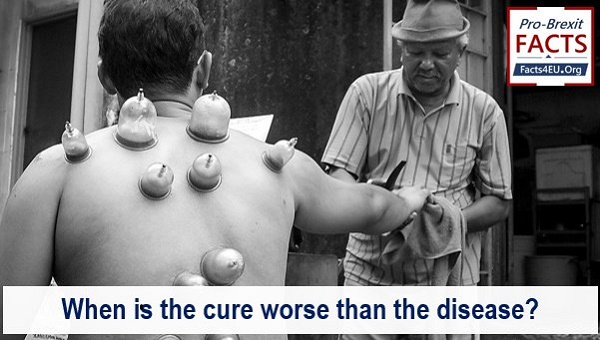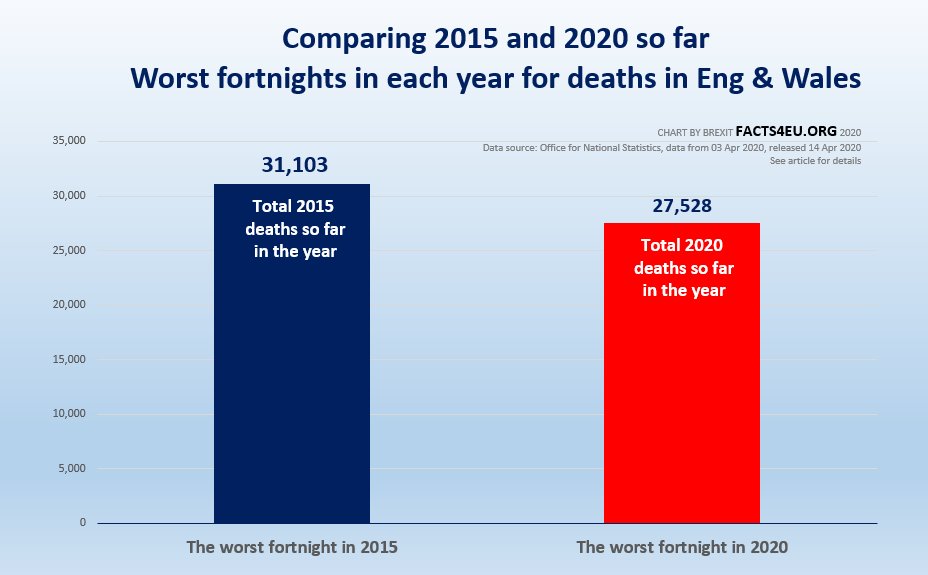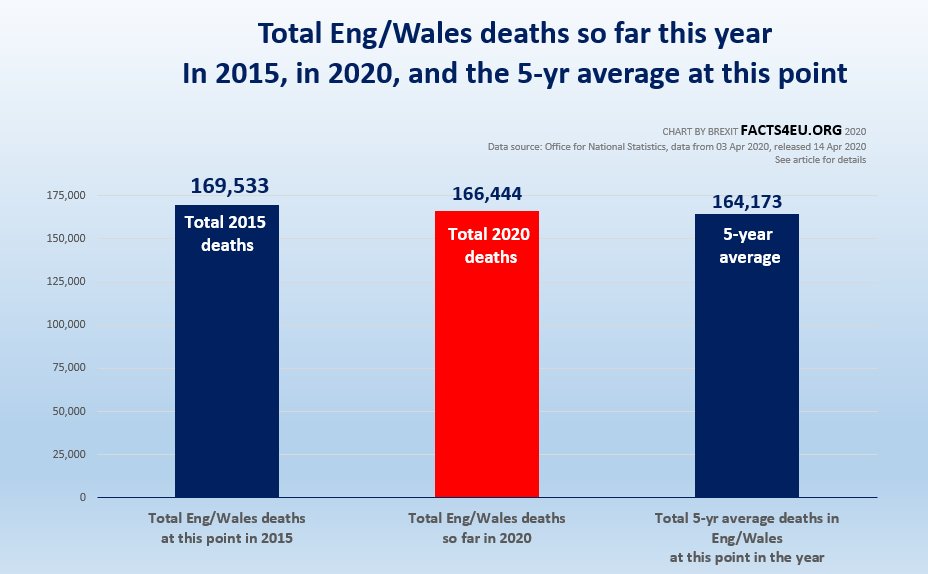Total deaths to this point in 2015 were higher than ONS’s latest 2020 figures
Deaths will rise faster, but 2020 numbers are still lower than five years ago

© Brexit Facts4EU.Org
Exclusive analysis of official figures by the Brexit Facts4EU.Org team
In just two weeks in January five years ago, 31,103 people died in England and Wales. That’s 2,222 per day. (These figures exclude Scotland and Northern Ireland.)
All the shops, factories, and offices stayed open. Football matches and other sporting fixtures took place as normal. People could leave their homes without fear of prosecution, and without fear of being informed on by their neighbours.
Fast forward to 2020, just five years later. In the latest two weeks for which the ONS has published figures, 27,528 people died. That’s less than the number who died in the two-week period in 2015 referred to above.
© Brexit Facts4EU.Org - click to enlarge
What about total numbers of deaths this year?
Below is a chart showing the number of people who have died this year so far, compared to the number who died in the same period in 2015. We have also included the average of the last five years, to give some balance. In each case the data covers the period up to the end of week 14. (That’s 03 April in 2020.) This is the last period for which the ONS has complete figures.
Brexit Facts4EU.Org Summary
Total deaths in 2015 to this point
are in fact higher than in this year.
1.9% higher than they are this year, to be exact.
© Brexit Facts4EU.Org - click to enlarge
If we adjust for the effects of immigration since 2015,
the numbers are over 4.5% higher in 2015 than now.
To be clear: this chart shows ALL deaths from ALL causes, in hospitals, care homes, at home, or in public places, in England and Wales.
Will deaths soon exceed those of previous years?
Yes, undoubtedly. We expect the ONS’s next weekly figures to show a very marked increase. We have absolutely no doubt whatsoever that the jump in deaths for the week ending 10 April will look alarming.
Our charts above merely show the position in England and Wales, based on the latest full set of data released by the ONS on Tuesday. They are intended to redress the balance a little, when compared to some of the more hysterical reporting from some sections of the media.
The simple fact is that total deaths are still lower than they were in 2015 – five years ago - when the country was not on lockdown and life was normal.
Will people be dying because of “the cure, not the cold”?
Readers are likely to know people who will not even attempt to visit their doctor, or to see a specialist they have already been seeing for a serious condition. We certainly know such people and one is on our team. We also observe that attendances at Accident & Emergency departments are at an all time low.
“The total number of attendances in March 2020 was 1,531,100, a decrease of 29.4% on the same month last year. These are the lowest number of attendances reported since this collection began and are likely to be a result of the COVID-19 response.”
- NHS England, latest report issued 07 Apr 2020
Medical practitioners all say that early diagnosis and treatment of most health conditions is one of the most important factors in the outcome for any patient. It seems highly probable that many extra deaths will now be being caused by the State’s reaction to the Coronavirus.
Observations
Next week we expect the number of deaths this year to overtake those in 2015 up to that date. We expect this trend to continue for some weeks before it starts to subside.
The big questions in all of this are the ones which almost all commentators have been afraid to ask. Certainly we felt on our own when we first started querying the data two months ago. We are pleased to note that some newspapers are finally publishing articles which are starting to ask the difficult questions.
We would like to throw a question at readers
For Coronavirus to have been an international pandemic/disaster closing down normal life,
by how much would you expect to see deaths to be higher than in other ’flu epidemic years?
10%? 50%? 100%? 250%?
We welcome your thoughts in the comments section below.
* * *
The battle for Brexit has so far consumed four years of our lives. Members of our team would like to go back to our businesses and to a ‘normal life’ where we are not working seven days a week.
Boris Johnson put 31 December 2020 into law, as the date when the UK will exit the “Transition Period” of colony status to the EU. We cannot abide one second more. We must conclude this chapter in our lives and move on to the joys of being a truly independent and outward-looking nation once again.
Please help us to continue our fight for free speech and a free country. We only survive now on public donations, as our own resources are exhausted. If you would like us to battle on and see our country become free, we ask you to donate whatever you can afford now.
Quick and secure links are below. Thank you so much and you will receive a personal thank you email from a team member.
[ Sources: ONS | NHS ] Politicians and journalists can contact us for details, as ever.
Brexit Facts4EU.Org, Wed 15 Apr 2020
Click here to go to our news headlines
And please scroll down to COMMENT on the above article.
Since before the EU Referendum, Brexit Facts4EU.Org
has been the most prolific researcher and publisher of Brexit facts in the world.
Supported by MPs, MEPs, & other groups, our work has impact.
We think facts matter. Please donate today, so that we can continue to ensure a clean Brexit is finally delivered.
Paypal Users Only - Choose amount first
Quick One-off
Monthly




Something to say about this? Scroll down for reader comments